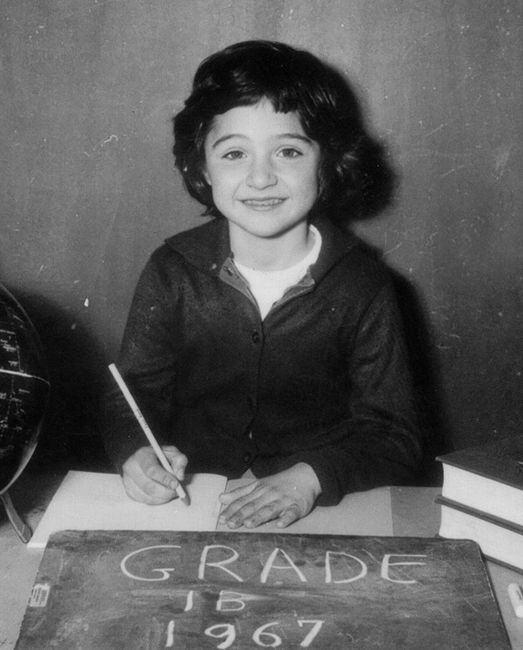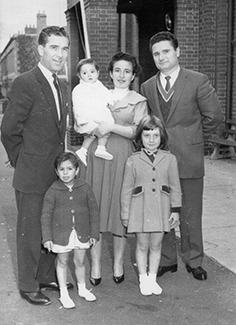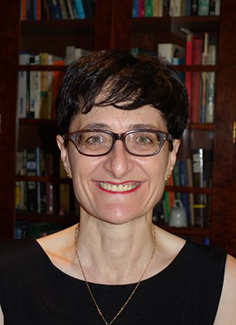Career
Copyright@ Australian Catholic University 1998-2026 | ABN 15 050 192 660 CRICOS registered provider: 00004G | PRV12008
Copyright@ Australian Catholic University 1998-2026 | ABN 15 050 192 660 CRICOS registered provider: 00004G | PRV12008

Growing up as a child of Greek migrants in inner-city Melbourne in the 1960s and ‘70s, Joy Damousi led what might be described as a double-life.
While roaming the gritty streets and winding laneways with her friends, she was just another footy-obsessed youngster; an Aussie kid who relished the edginess of her colourful neighbourhood. But once she walked through the front door of her family’s pint-sized terrace in Fitzroy, she was proudly and passionately Greek.
“At home, I would embrace my Greek heritage and celebrate it, but in the outside world, there were very few avenues for that celebration,” says Damousi, a Professor of History and author of Memory and Migration in the Shadow of War.
“It was a complicated intersection of public and private lives, because I grew up in a period of Australian history which was dominated by the expectation of migrants to assimilate, and that expectation was very real.”
For most of the 1960s, Australia still actively pursued a uniform white culture, with the government openly tracking the progress of new migrants and implementing “measures which might be taken to facilitate satisfactory assimilation”.
Thanks to her parents George and Sofia, who were part of the massive post-war migration of Greeks to Australia in the ‘50s, the young Joy maintained a connection with her heritage.
“My parents had an acute sense of the very long and rich history of our family’s experience in Europe, and they were both great storytellers who were very keen to impart that history to us here in the diaspora,” she says.
“So there’s always been a connection there, but it’s a connection that’s been negotiated, because it’s not easy being in a culture where there’s a question around your heritage, and that was certainly the case when I was growing up.”
For many kids with foreign backgrounds — especially those who, like Joy, couldn’t speak English until they went to school — local staples like Aussie rules and cricket gave them a way of fitting in.
“I became and remain to this day a very passionate football follower,” says Damousi, a diehard Collingwood fan who co-authored the book Footy Passions in 2009.
“Reflecting on my childhood, Australian football gave me a way of assimilating into that society, but it was also a kind of rebellion … I was starting to find my own identity and my own culture that was outside of the Greek culture of my parents.”
Despite this friction, her parents’ vivid recollections of brutal and bloody conflict in their homeland helped to spark Joy’s interest in history, and this has only grown stronger through her life.
In Memory and Migration, Professor Damousi describes the personal dimension in her research, and of how many of the questions she addresses have emerged from her family history.
“I, like so many in my generation, Australian born, grew up listening to these stories about war being told over and over again,” she writes in her acclaimed book. “These stories became an important part of my parents’ generation and my Greek identity…”

But not all of Professor Damousi’s work cuts so close to the bone. Her research is impressively varied, traversing diverse subjects such as feminism and transnationalism, trauma and the senses, violence and psychoanalysis.
“I think for anyone working in history and other parts of the humanities, we tend to be drawn to particular questions, texts and paradigms because they speak to us and have some kind of connectedness to our experience,” she says.
“But personal experiences can only take you so far in asking questions, and the scholar in us continues that line of inquiry beyond the personal, and takes it into new realms.”
In a career spanning more than three decades, Professor Damousi has shed new light on many aspects of Australia’s social and cultural history. She is recognised as one of the nation’s most distinguished historians and public intellectuals; an award-winning scholar who, in 2014, received the Australian Research Council’s coveted Kathleen Fitzpatrick Australian Laureate Fellowship for her research leadership and scholarly excellence.
In early 2020, she was appointed as director of ACU’s new Institute of Humanities and Social Sciences — a homecoming of sorts for the proud Melburnian, whose childhood home in Napier Street is a stone’s throw from ACU’s Melbourne Campus.
One of her main goals with the institute is to position the humanities and social sciences at the fore of public and academic debate, with cutting-edge research on the subjects of migration, gender and post-colonial history.
As president of both the Australian Academy of the Humanities and the Australian Historical Association, she spends much of her time talking up the importance of the arts and humanities to society, at a time when many in the sector feel besieged and undervalued.
“A world without culture, without the arts and humanities, is a very desolate world, and I think what the pandemic demonstrated — interestingly and unexpectedly — is the fundamental importance of these things to our wellbeing,” Professor Damousi says.
“I think it’s our job as people in the humanities to constantly keep that at the fore of consciousness, to highlight that we need arts and culture, that we to have an understanding of history, philosophy and literature, so we can get a deeper understanding of what it means to be human.”
She speaks with similar passion about the importance of studying history, and says that those who don’t engage with the past risk proceeding with profound ignorance.
“Without a sense of history — an understanding of where we’ve come from and how that has shaped us — we have no sense of identity or purpose or connection, and it can be incredibly dangerous as well, because we can take lessons from history in order to avoid repeating things we don’t want to repeat.”
But not only is history a way of gaining knowledge and disseminating it, it’s also “endlessly fascinating and riveting”. Her own love of history, sparked by her mother’s colourful, drama-filled stories, continued to be stoked on the streets of Fitzroy.
“There was a fascination for me in the landscape of where I was growing up, which was on the cusp of great change,” she says, “and I can still remember being intrigued by the detail of the century-old Victorian houses, the wonderful imposing arches and stylistic animal iconography … I found that really compelling.”
Joy watched on as Fitzroy’s slums were felled to make way for gentrification, and the suburb’s development has become a reflection of her own personal growth. She still finds a sense of wonder in the fact that her family, in a small but significant way, is etched into the history of Melbourne’s oldest suburb.
“I was baptized in the church that’s opposite my office at the institute, and as a child, these streets were very familiar to me, so it’s a wonderful thing, at this point of my career, to almost come back to the beginning,” Professor Damousi says.
“To be the director of this institute is exciting in a professional sense, because it’s an opportunity for our researchers to produce world-class research in history, politics, sociology and literature, but it’s also quite extraordinary in a personal sense, because it takes me back to the Fitzroy of my childhood, and it has really brought these connections together.”
Professor Joy Damousi is an award-winning scholar of memory and war, the history of emotions, and migration history in relation to refugees, humanitarianism and internationalism. She is one of Australia’s most distinguished historians and public intellectuals, and a leader in the humanities in Australia and internationally.

Passionate about the humanities and social sciences? Explore your options at ACU.
Copyright@ Australian Catholic University 1998-2026 | ABN 15 050 192 660 CRICOS registered provider: 00004G | PRV12008